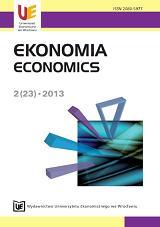Wpływ globalizacji na politykę fiskalną państw OECD w latach 1965-2011
Impact of globalization on fiscal policyof OECD countries in the years 1965-2011
Author(s): Lech Kalina, Monika Lewandowska-KalinaSubject(s): Economy
Published by: Wydawnictwo Uniwersytetu Ekonomicznego we Wrocławiu
Keywords: globalization; fiscal policy; taxes; OECD countries
Summary/Abstract: In the economic literature there is a well-known hypothesis that the states in the era of globalization, due to the increased mobility of labor and capital, are losing their ability to pursue fiscal policies; especially the imposition and maintenance of high tax rates become impossible. These concerns are shared first of all by the European social model advocates who argue that the process of global economic integration will strike with vengeance in the concept of the welfare state and make the policy of maintaining high, progressive taxes, massive transfers of wealth and income redistribution not possible to maintain. The state will have no other option but to withdraw from their positions and radically reduce the tax burden. The article analyzes the impact of globalization and openness of the economies on the ability of states to run their own fiscal policy. The authors set themselves the goal of verifying the hypothesis that rich countries are forced to cut taxes (and thus reduce social spending and internal liberalization) under the pressure of competition from poor countries (known in English-language literature as “race-to the-bottom”. In order to verify hypotheses about the impact of openness of the economy on shaping tax policy the authors have estimated the econometric panel models, on the unbalanced panel of OECD countries in the period 1965-2011 and for the sub-samples in the years 1995-2011. They use different types of taxes as dependent variables, and inflow of foreign direct investment, the openness of the economy, GDP per capita relative to the U.S. economy and the share of government consumption in GDP as explanatory variables. The data for 33 developed countries in the years 1965-2011 come from OECD databases, the World Bank and Penn World Tables. A total sample contains 1599 observations. Contrary to the race-to-the-bottom hypothesis the estimation showed a strong, positive and statistically significant correlation between the share of corporate tax and value added tax and the openness of the economy. However, this result does not hold for income tax. Also, social security contributions were found to be strongly associated with the openness of the economy A strong, positive and statistically significant correlation was found for the years 1965- -2011 and also strong, and statistically significant but negative correlation was found for 1995-2011 subpanel. The results of the analysis lead to the question about the reasons for increase in the share of value added tax and corporate tax to GDP with the increasing openness of the economy. One can argue that the answer lies in the nature of value added tax.
Journal: Ekonomia
- Issue Year: 2013
- Issue No: 23
- Page Range: 64-76
- Page Count: 13
- Language: Polish

